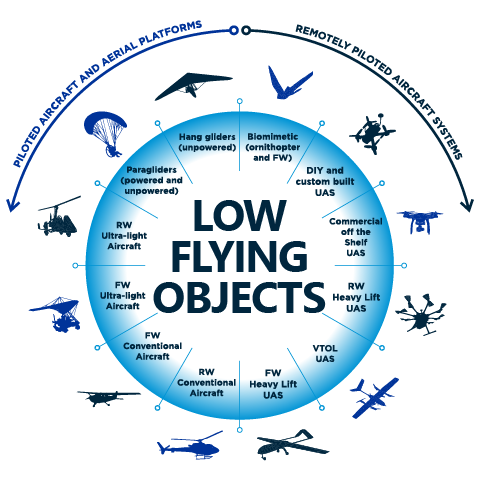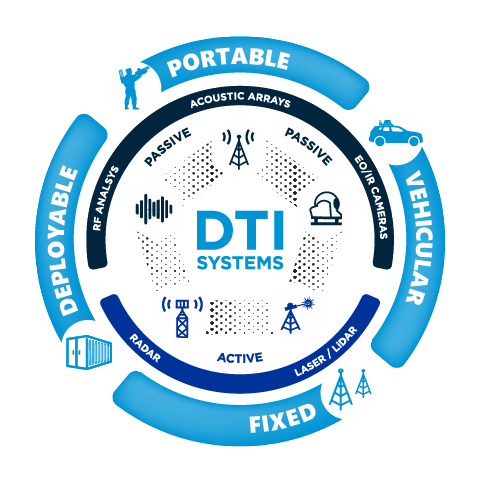On 16 December 2022, Frontex launched the Prize Award Contest on the Detection of Low Flying Objects (aerial platforms that operate in low-level airspace, from piloted ultralight and conventional aircraft to remotely piloted aircraft systems).
The goal of the contest is to incentivize the industry to develop innovative new concepts and technological solutions for cost-efficient, scalable, and integrated operational capabilities, and to reward the best performing technological solutions. We are also aiming at obtaining insights into how these solutions may support a proof-of-concept validation of what an effective multi-layered, multi-sensor surveillance model might be for the detection of low flying objects at EU borders.
The prize award contest welcomes proposals from all types of organisations including public and
private sector, as well as non-profit entities established in one of the EU Member
States, including overseas countries and territories. Non-EU entities are able to apply under specific conditions.
Proposals can be
submitted by mono-beneficiaries (single applications) or by consortia (joint
applications).
Considering the existing technological solutions available on the market
(or those currently under development) and their potential combination in a multi-layered,
multi-sensor model, how can Low Flying Objects be effectively detected,
tracked, and identified on European land borders in a cost-efficient,
scalable and integrated way?
The proposed
technological solutions should present:
- Innovative and effective capabilities
- Multi-layered
approach
- Different deployment options
For the European Border and Coast Guard community,
the term “low-flying objects” (LFO) covers a broad set of aerial platforms that
operate in low-level airspace. The definition of “low-level airspace” utilized
throughout this prize contest will be defined as airspace below 1000 ft above
the ground level. LFOs include a wide range of aerial platforms, from piloted
ultralight and conventional aircraft to remotely piloted aircraft
systems.
Why should we detect LFOs? Emergent
threat to EU safety and security?
The illegal use of low
flying objects has become an emergent threat to the overall safety and security
across the world, as malicious actors are adopting drone technology and
developing new, creative, and sophisticated ways to commit cross-border illicit
activities. The increasing careless, clueless, or criminal use of drones and
other low-flying objects raises important questions on the effective management
of malicious drone activity. This emerging trend has accentuated a very
well-known challenge of low-level air border monitoring at EU’s internal and
external borders.
At the EU level, the
European Commission is committed to support EU Member States in mitigating
the non-cooperative UAS threats, especially in the hands of malicious actors
(criminals and terrorists).
Contributing to the
overall coherence with EU strategic initiatives and considering that the
complex nature of the detection of low-flying objects at EU’s borders requires
a comprehensive approach, Frontex launched this prize award contest as a
platform to establish a preliminary, yet accurate overview of state-of-the-art
technologies in terms of capabilities and limitations, as well as their
suitability to EBCG needs.
- Prize award contest
participants should propose a technological solution that includes at least three
systems, using a combination of both active and passive detection capabilities
(for example: RF frequency monitoring, camera, and radar).
- Any other
type of technical equipment, capability or service offered in the application
will be assessed favourably, as additional features may enrich the proposal if
relevant for the scope of this initiative.
- The final version of the presented
solutions during the operational trials must have an appropriate level of
technological maturity (TRL 6 or above).
The applicants are invited to read the requirements included in the rules of the prize contest.
The prize award contest will be organized in three distinct phases.
Schedule timeline:
PHASE 1:
- Call for Prizes: 16th December
2022 – new deadline 21st February 2023
- Deadline for submission of
proposals: new deadline 21st of February 2023 at 12:00:00 CET
(Warsaw time)
- Screening of eligibility and
admissibility conditions for participation: February - April 2023
- Evaluation of white papers: February
– May 2023
- Announcement of laureates: June 2023
- Prize contest payments: July 2023
PHASE 2:
- Deadline for the submission
of technical proposals: 07 July 2023
- Technical capacity
presentations: June – July 2023
- Announcement of laureates:
August 2023
- Prize contest payments: August
2023
PHASE 3:
- Pre-deployment coordination
meetings (virtual): August 2023
- Deployment preparations
period: August
- September 2023
- Deadline to deploy to the
host EU Member State:
15 September 2023
- CIT stage (1 week): 18 – 22 September 2023
- Operational Trials (2
weeks):
25 September - 6 October 2023
- Live demonstration event to
EC, EU Agencies and MSs: 2- 6 October 2023
- Announcement of laureates: November 2023
- Final awarding ceremony: December 2023
- Prize contest payments: December
2023
This schedule may be changed without prior notice.
Current version dated from 26.04.2023
Additional incentives:
PROMOTION
The winners of the
prize award contest (first, second and third prizes) will have the opportunity
to promote their ideas, results, and technological solutions in a dedicated
event with the wider European Border and Coast Guard community, including
European Commission, EU Agencies and Member State’s representatives and
experts.
FEEDBACK
The winners will have
the opportunity to present their ideas, results, and technological solutions to
a network of experts from the European Border and Coast Guard community on
different occasions through expert-level meetings and workshops.
VISIBILITY
Frontex will promote
and support the visibility of the technological solutions that underwent
operational testing, by granting a symbolic “participation badge”
for each prize winner that can be used publicly.
OPERATIONAL
TRIALS
The participants will
benefit from an operational sandbox environment centered around real-world
simulations of Low Flying Object threats, that will be emulated by an
adversarial independent testing team. The operational trials will allow an
immersive testing and evaluation environment by bridging the gap between
industry and experts, promoting networking and discussions on a working level.
This will support a more thorough understanding of EBCG community's operational
needs.
INSIGHTS
The participants will
have access to weekly debriefings and retrospective sessions to further
understand the threat scenarios and modus operandi, so that they can
improve and optimize their solutions.
NETWORKING
Additionally, the participants will have
the opportunity to develop partnerships or identify potential business
opportunities with other participating companies but also with experts,
end-users, EU representatives and stakeholders.
Please email us if you have any questions: prize.award@frontex.europa.eu




